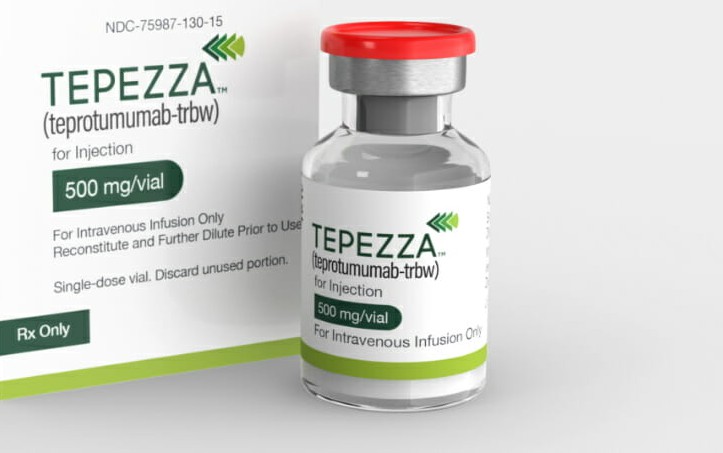How a Tepezza Lawsuit Could Help
• Past and future medical bills
• Loss of income
• Loss of future earning capacity
• Physical pain and suffering
• Emotional trauma
• Disability
• Inability to perform daily activities
Clinical trials for a relatively new Thyroid Eye Disease medication called Tepezza have demonstrated an increased risk of hearing-related side effects, most notably hearing loss, in patients taking the medication compared to those receiving a placebo. Although these side effects were reported to be reversible upon discontinuation of Tepezza treatment, emerging evidence suggests that hearing loss, tinnitus, and other adverse hearing events associated with Tepezza may be irreversible. Contact us today to find out more about the potential risk of hearing loss and other hearing problems from Tepezza treatment.

Cases of Tepezza users experiencing moderate to severe hearing loss that remains unresolved are well documented. During clinical trials designed to evaluate the safety of Tepezza compared to a placebo, hearing impairment was identified as one of the most common adverse reactions occurring at greater incidence in the Tepezza group (10%) than in the control group (0%). And while these findings are mentioned in the clinical trial information on the Tepezza label, information about the potential risk of hearing impairment from Tepezza treatment has been left off the drug warning label. This is despite the fact that the Tepezza prescribing information lists as a potential adverse reaction hyperglycemia, which occurred at the same rate as hearing impairment in the Tepezza trials. Many Tepezza users have no knowledge of the potential for the Thyroid Eye Disease drug to cause hearing loss, despite the fact that approximately 10% of all Tepezza adverse events reported to the safety database have included a hearing-related event, the most common being hypoacusis (reduction in hearing) and tinnitus (ringing in the ears). Patients taking Tepezza to treat Thyroid Eye Disease may be entitled to compensation for any hearing loss that remains unresolved after stopping the drug treatment.
• Hearing loss
• Deafness
• Hypoacusis
• Muffled hearing
• Tinnitus
• Ringing of the ears
• Autophony
• Ear plugging sensation
• Eustachian tube dysfunction
“Clinical trials and post market studies have both found that Tepezza use has been linked to an approximate 10% rate of patients reporting a hearing loss related injury. By comparison, there were no reports of hearing loss by individuals given a placebo in the clinical trial.”
Tepezza (teprotumumab-trbw) is an intravenous infusion medication manufactured by Horizon Therapeutics Ireland DAC and marketed as a treatment for adults with Thyroid Eye Disease (TED), a rare but serious and progressive autoimmune disease characterized by inflammation of the muscles and fatty tissues behind the eye. This inflammation can cause the eyes to be pushed forward, resulting in proptosis, or the outward bulging of one or both eyes from their natural position. Tepezza is a human monoclonal antibody and IGF-1R inhibitor designed to reduce the eye pain, swelling and redness symptoms associated with Thyroid Eye Disease, and the drug is administered as an infusion one every three weeks, for a total of eight infusions. According to the FDA, TED affects a relatively small number of Americans. However, the condition can be debilitating and people with TED may be unable to perform important daily activities, such as working or driving. Since Tepezza is currently the only FDA-approved treatment for Thyroid Eye Disease, many people who seek treatment for TED are given Tepezza.
• Past and future medical bills
• Loss of income
• Loss of future earning capacity
• Physical pain and suffering
• Emotional trauma
• Disability
• Inability to perform daily activities
The FDA approved Tepezza in January 2020, granting the drug application Priority Review, as well as Fast Track and Breakthrough Therapy designation, which expedited the agency’s review process and allowed the medication to enter the market earlier than it would have otherwise. The FDA’s approval of Tepezza was based on the results of two clinical trials (Study 1 and 2), which consisted of a total of 170 patients with active TED. According to the FDA, one of the most common adverse reactions in patients treated with Tepezza was hearing loss. In phase 2 and 3 trials of Tepezza, 85% of patients given the Thyroid Eye Disease medication experienced adverse events, with 10% of patients reporting hearing loss symptoms, compared to 0% of patients given the placebo. In order to better understand the connection between Tepezza and hearing loss symptoms, the researchers followed 28 patients who received at least four Tepezza infusions at a single institution. Of these patients, 13 (46%) reported experiencing hearing symptoms, the most common being hearing loss, muffled hearing, and autophony, or an ear plugging sensation. Additionally, the researchers found that the Tepezza patients who complained of hearing problems did not experience a significant improvement in their symptoms even months after stopping Tepezza treatment.
Increased risk of hearing impairment with new thyroid eye disease treatment – Small study finds 65 percent of patients taking teprotumumab report otologic symptoms
What is Thyroid Eye Disease? – Graves’ eye disease, also called Graves’ Ophthalmopathy or Thyroid Eye disease, is a problem that usually develops in people with an overactive thyroid caused by Graves’ disease. Graves’ disease is an autoimmune disease caused by antibodies directed against receptors present in the thyroid cells and also on the surface of the cells behind the eyes.
Teprotumumab and Hearing Loss: Case Series and Proposal for Audiologic Monitoring – Teprotumumab may cause a spectrum of potentially irreversible hearing loss ranging from mild to severe, likely resulting from the inhibition of the insulin-like growth factor-1 and the insulin-like growth factor-1 receptor pathway.